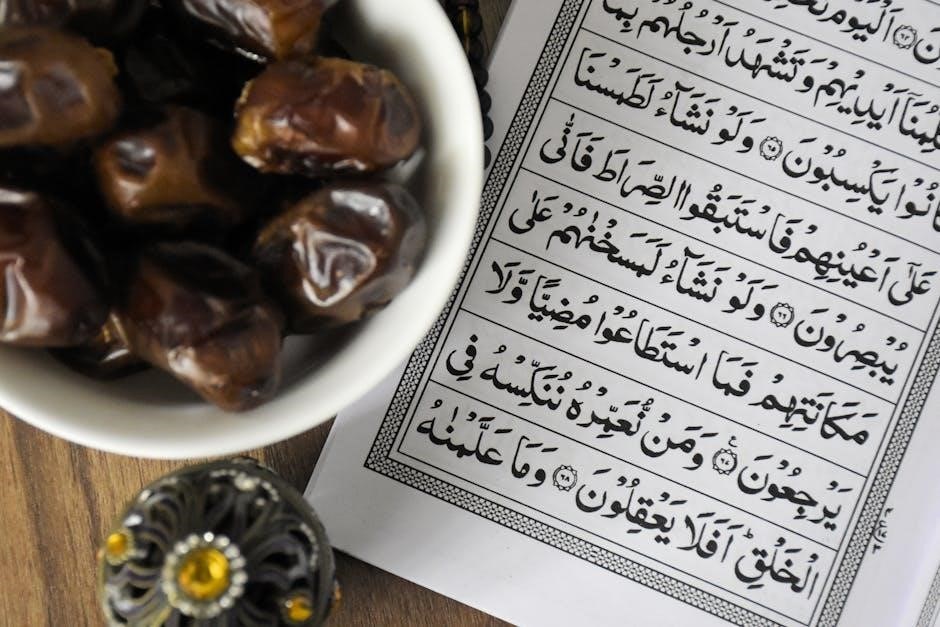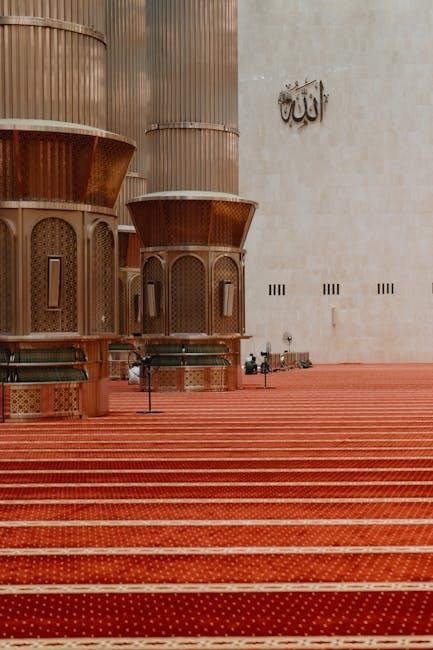Significance of Dua in Ramadan
Dua is a powerful act of worship and a direct line of communication with Allah. During Ramadan, the significance of Dua amplifies as the month is adorned with divine blessings and mercy. It is a means to seek forgiveness, guidance, and strength. The holy month offers a unique opportunity for Duas to be more readily accepted, especially during moments like iftar and the last ten nights. Organized Dua lists help Muslims focus their supplications, making worship more meaningful and consistent. Dua is a cornerstone of Ramadan, fostering spiritual growth and connection with Allah.
Overview of Ramadan Dua List PDF
The Ramadan Dua List PDF is a comprehensive guide featuring supplications compiled from the Quran and Hadith. Organized by topics such as family, health, and personal growth, it provides structured supplications to enhance worship. Authored by Zulekha Shakoor Rajani, this document offers tips for effective Dua-making and serves as a valuable resource for Muslims seeking to deepen their spiritual practice during Ramadan. It is available for free download as a PDF or text file, making it accessible for all. This list helps individuals focus their supplications, ensuring a meaningful and purposeful Ramadan experience.

Categories of Duas in Ramadan
Ramadan Duas are categorized to address various aspects of life, including personal growth, family, health, and community. These categories help focus supplications for specific needs and circumstances, ensuring a balanced and meaningful spiritual practice during the holy month.
Duas for Personal Growth and Reflection
This category focuses on supplications that foster self-improvement, gratitude, and spiritual awareness. Duas like seeking forgiveness, guidance, and strength help believers reflect on their actions and intentions.
These prayers, sourced from the Quran and Sunnah, encourage mindfulness and humility, aiding in the pursuit of a righteous and purposeful life. Key supplications include those for self-refinement, protection from sins, and the ability to practice consistent worship throughout Ramadan. These Duas are essential for personal transformation and deepening one’s connection with Allah during the holy month.
Duas for Family and Community
These supplications focus on nurturing relationships and seeking blessings for loved ones. Duas for family harmony, children’s guidance, and community well-being are central.
They include prayers for parents, spouse, and children, ensuring their health, success, and righteousness. Specific supplications like seeking protection for family members and asking for blessings in their lives are emphasized. These Duas foster a sense of unity and collective spiritual growth, encouraging believers to prioritize their loved ones’ well-being during Ramadan.
Duas for Health and Well-being
These supplications focus on seeking physical and mental health during Ramadan. Duas include prayers for recovery from illness, protection from harm, and overall well-being.
Specific supplications like “O Allah, grant me health and well-being” are recommended. These Duas emphasize gratitude for health and request strength to fulfill religious obligations. They also include prayers for loved ones, ensuring their health and safety throughout the holy month. Such supplications reinforce the importance of health in worship and daily life.
Popular Ramadan-Specific Duas
These essential supplications are tailored for key Ramadan moments, enhancing worship and connecting deeply with Allah. They include Duas for sighting the moon, breaking fasts, and the last ten nights.
Dua for Sightings of the New Moon
The sighting of the new moon marks the beginning of Ramadan, and a specific Dua is recommended to invoke Allah’s blessings. The Dua, “O Allah! Safeguard me for the Month of Ramadan…,” seeks health, fitness, and maximum benefit from the holy month. This supplication emphasizes preparation and intention, helping believers focus on spiritual growth. It is sourced from Kanzul Ummal and is featured in the Ramadan Dua List PDF for easy access and recitation.
Dua for Breaking the Fast (Iftar)
The Dua for breaking the fast, or Iftar, is a profound supplication expressing gratitude and seeking Allah’s mercy. Featured in the Ramadan Dua List PDF, it includes the Arabic text: “Dhahaba al-zama’ wa l-basat al-‘irqu, wa thabata al-ajru insha’Allah.” Translated, it means: “The thirst is gone, the veins are moistened, and the reward is confirmed, if Allah wills.” This Dua highlights the blessings of fasting and the hope for divine acceptance, fostering a sense of gratitude and spiritual renewal.
Dua for the Last Ten Nights of Ramadan
The last ten nights of Ramadan hold immense spiritual significance, particularly Laylat al-Qadr (the Night of Power). A recommended Dua for these nights is: “Allahumma innaka afuwwun tuhibbul afwa fa’fu anni.” Meaning: “O Allah, You are the One Who pardons extensively, and You love to pardon, so pardon me.” This supplication, found in the Ramadan Dua List PDF, seeks forgiveness and mercy during these blessed moments. Reciting it consistently is a beautiful way to maximize the spiritual benefits of Ramadan’s final days.
Benefits of Using a Ramadan Dua List
Using a Ramadan Dua List enhances focus and consistency in worship, while organizing supplications for specific needs. It increases the likelihood of Dua acceptance, guiding you effectively.
Enhancing Focus and Consistency in Worship
A Ramadan Dua List helps believers maintain focus and consistency in their supplications throughout the holy month. By organizing prayers into categories, worshippers can address specific needs, such as seeking mercy, forgiveness, or guidance. This structured approach ensures that daily supplications remain aligned with Islamic teachings, fostering a deeper spiritual connection. The list also encourages regular practice, making worship a habit and enhancing the overall Ramadan experience. It serves as a reminder to stay mindful and sincere in one’s devotion, ultimately strengthening faith and commitment.
Increasing the Likelihood of Dua Acceptance
Using a Ramadan Dua List can significantly increase the likelihood of your supplications being accepted. Sincerity and repentance are key, as Allah favors heartfelt and humble prayers. Timing also plays a role, with moments like the last ten nights of Ramadan being particularly blessed. Additionally, incorporating authentic duas from the Quran and Hadith ensures alignment with Islamic teachings, further enhancing the chances of acceptance. Consistency in supplication and maintaining a righteous state also contribute to divine favor.
How to Create a Personalized Ramadan Dua List
Create a tailored Ramadan Dua list by categorizing supplications from the Quran and Hadith, focusing on personal goals, and organizing them for daily reflection and worship.
Steps to Customize Your Dua List
To create a personalized Ramadan Dua list, start by identifying your specific needs and goals. Categorize supplications based on themes like health, family, and personal growth. Incorporate Quranic verses and Hadiths for authenticity. Prioritize daily supplications and include space for reflection. Regularly review and update your list to align with your spiritual journey. This structured approach ensures focused and meaningful supplications throughout Ramadan.
Incorporating Quranic Verses and Hadith
Enhance your Ramadan Dua list by integrating verses from the Quran and authentic Hadiths. These sacred sources provide guidance and inspiration, ensuring your supplications align with Islamic teachings. Include specific verses like Surah Al-Fajr for forgiveness or Surah Al-Ikhlas for seeking divine help. Hadiths, such as those encouraging repentance during Ramadan, add depth to your prayers. This practice not only enriches your spiritual connection but also increases the likelihood of your duas being accepted.

Authenticity and Sources of Ramadan Duas
Ensure your Ramadan Dua list is derived from verified sources, such as the Quran, Hadith, and reputable Islamic scholars. This guarantees the validity and effectiveness of your supplications.
Importance of Verified Sources

Using verified sources for Ramadan duas ensures authenticity and alignment with Islamic teachings. These sources, often derived from the Quran, Hadith, and reputable scholars, guarantee the supplications are valid and meaningful. Unverified duas may lead to misguidance or innovation, which can undermine their effectiveness. By relying on trusted resources, believers can confidently engage in supplications that are both correct and impactful, fostering a deeper connection with Allah during Ramadan. This ensures their duas are not only sincere but also in line with divine guidance and tradition.
Recommended Resources for Authentic Duas
For authentic Ramadan duas, rely on resources like the Quran, Sahih Hadith collections, and scholarly works. Websites such as QuranLyfe and Islamic institutions provide verified supplications. Additionally, trusted scholars and apps like Muslim Pro offer curated dua lists. PDFs compiled by reputable authors, such as Zulekha Shakoor Rajani, ensure the supplications are genuine and meaningful. These sources guide believers in making heartfelt, divinely-inspired supplications, enhancing their spiritual journey throughout Ramadan. They are essential for maintaining the purity and effectiveness of one’s prayers.

Daily Ramadan Dua Schedule
A structured daily Ramadan dua schedule helps believers maintain consistency. Timed supplications, such as morning and iftar duas, guide seekers in aligning their prayers with sacred moments, enhancing spiritual focus and devotion throughout the holy month.
Structuring Your Day with Specific Duas
Organizing your supplications throughout Ramadan ensures a meaningful spiritual journey. Begin with morning duas for seeking mercy and guidance, followed by specific prayers during suhoor and iftar. Allocate time for reflective supplications post-salah and before bed. The last ten nights offer unique opportunities for intensive dua, focusing on forgiveness and acceptance. Using a Ramadan Dua List PDF, you can schedule prayers for each phase, ensuring consistency and maximizing the blessings of the holy month.

Examples of Daily Dua Practices
Daily dua practices during Ramadan can be enriched with specific supplications. Start your day with the morning dua for seeking mercy and guidance, followed by prayers during suhoor. Recite the recommended dua for breaking your fast at iftar. Use the Ramadan Dua List PDF to incorporate supplications post-salah and before sleep. Allocate time for reflective prayers, especially in the last ten nights, focusing on forgiveness and acceptance. Consistency in these practices enhances spiritual growth and connection with Allah throughout the holy month.

Ramadan’s transformative power lies in its structured duas. These supplications connect us deeply with Allah, aiding in reflection and acceptance. Use the Ramadan Dua List PDF to maximize blessings and emerge spiritually renewed.
The Impact of Ramadan Duas on Spiritual Growth
Ramadan duas hold immense power in fostering spiritual growth. These supplications, compiled in the Ramadan Dua List PDF, guide believers to seek forgiveness, mercy, and guidance. By focusing on themes like self-reflection, gratitude, and devotion, Muslims deepen their connection with Allah. Consistent practice of these duas enhances mindfulness, strengthens faith, and cultivates a sense of humility. The structured nature of the PDF ensures that worshippers can effortlessly incorporate meaningful supplications into their daily routines, fostering a transformative spiritual journey throughout the holy month.
Final Thoughts on Maximizing the Benefits of Ramadan
Ramadan offers a unique opportunity to rejuvenate spiritually and draw closer to Allah. By utilizing the Ramadan Dua List PDF, believers can stay focused and consistent in their supplications. Emphasizing gratitude, self-reflection, and sincere devotion helps maximize the holy month’s blessings. Prioritizing meaningful worship, fostering compassion, and seeking Allah’s mercy are key to a transformative Ramadan experience. May this sacred time bring profound spiritual growth, renewed faith, and lasting positive change in all aspects of life.